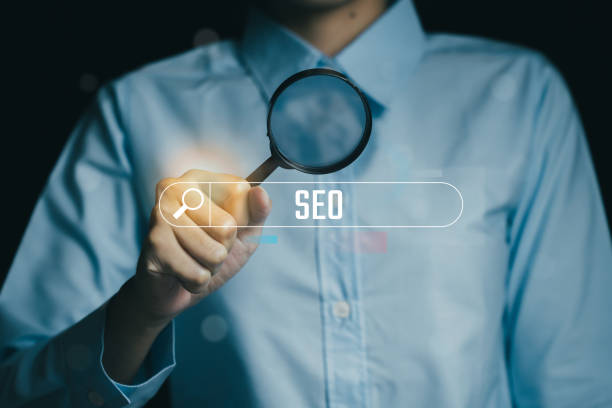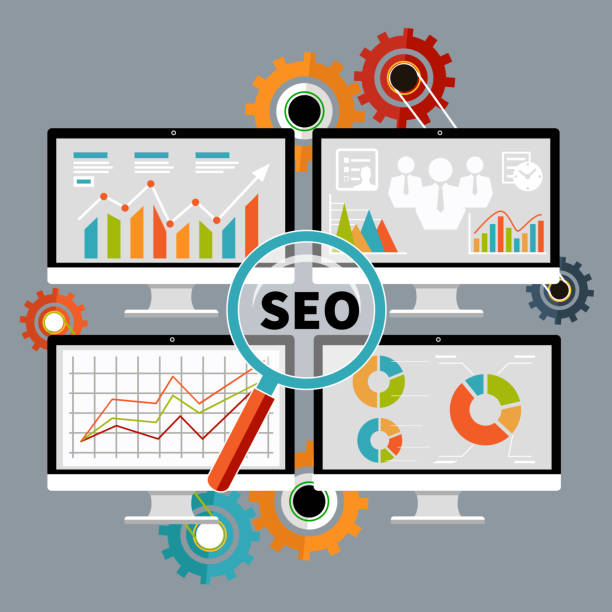Introduction to SEO and its Importance in the Digital World

In the current era, an online presence is vital for any business or individual who wants to be seen.
This is where the concept of #SEO or #Search_Engine_Optimization comes into play.
SEO is a set of techniques and strategies that help your website gain a better position in the organic search results of engines like Google.
The main goal of SEO is to increase your website’s visibility, which leads to more traffic and, ultimately, business growth.
The importance of SEO is not limited to increasing visits; it also helps attract high-quality and targeted traffic.
When a user searches for a phrase, they expect to receive the best and most relevant answer.
Search engines do exactly that.
Therefore, with strong SEO, you not only appear high in the results but also show users that your content is exactly what they are looking for.
This educational and complex process, but its results are undoubtedly worth the investment.
As competition in the online space becomes fiercer day by day, mastering the principles of SEO is essential for the survival and progress of any digital entity.
This guide will explain the various aspects of SEO and pave the way for improving your website’s ranking.
Are visitors leaving your e-commerce site before making a purchase? Don’t worry anymore! With Rasaweb’s professional e-commerce website design services, solve the problem of converting visitors into customers forever!
✅ Significant increase in conversion rates and sales
✅ Unparalleled and engaging user experience
⚡ Contact us now for a free consultation!
The Role of Keyword Research in Website Optimization

Keyword research is the backbone of any successful #SEO strategy.
Without understanding what phrases your users are searching for, optimizing your website will be almost impossible.
This process involves discovering the words and phrases your target users employ when searching on search engines.
Precise keyword research not only indicates search volume and keyword competition but also provides valuable insights into user Intent.
Is the user looking for information, intending to buy, or wanting to go to a specific website? Understanding Intent helps you create more relevant and useful content.
Various tools exist for keyword research, including Google Keyword Planner, Ahrefs, Semrush, and Moz Keyword Explorer.
Using these tools to find Long-Tail keywords that are less competitive but more targeted is very helpful.
Analytical thinking is key at this stage; you must be able to extract patterns and opportunities from the data.
By choosing the right keywords, you not only attract more traffic but also direct higher-quality traffic to your website, increasing the likelihood of converting them into customers or loyal visitors.
This specialized and fundamental step in SEO strategy should be considered at every stage of website SEO.
On-Page SEO and the Importance of Content

On-Page SEO refers to all the actions you perform within your website to improve its ranking in search engines.
This includes optimizing various elements such as Title Tags, Meta Descriptions, Heading Tags (H1, H2, H3), text content, images, and URLs.
Title tags and meta descriptions are the first things users see in search results, so they should be appealing and contain primary keywords.
Engaging and high-quality content is the heart of on-page SEO.
Your content should not only be optimized for search engines but, more importantly, it should be valuable and readable for users.
Natural use of keywords, answering user questions, and providing comprehensive and accurate information are fundamental principles of SEO-friendly content creation.
Optimizing images (using appropriate Alt Text) and creating user-friendly URL structures for both users and search engines are also of great importance.
The goal of on-page SEO is to send clear signals to search engines about your page’s content.
This part of technical SEO plays a vital role in determining your page’s authority and relevance to target keywords.
For your website to shine in search results, a comprehensive and precise on-page SEO strategy is essential.
Key Elements of On-Page SEO
| On-Page SEO Element | Description | Importance |
|---|---|---|
| Title Tag | The title displayed in the browser tab and search results. | Very Important: The first point of contact with the user and search engine. |
| Meta Description | A brief summary of the page content displayed in search results. | Important: Influences Click-Through Rate (CTR). |
| Headings (H1-H6) | Structured titles and subtitles within the text. | Medium: Improves readability and helps search engines understand content structure. |
| Text Content | Quality, depth, relevance, and freshness of content. | Very Important: The core of user attraction and retention. |
| Images (Alt Text) | Textual description for images, for accessibility and image SEO. | Important: Helps search engines understand images and improve image rankings. |
Off-Page SEO and Link Building

Off-Page SEO refers to all activities performed outside your website that help improve its ranking in search engines.
The most important part of off-page SEO is Link Building.
Links act as a vote of confidence from other websites to your content.
The more numerous and higher quality the links pointing to your website, the more search engines will consider your website authoritative and trustworthy.
However, it’s not just the number of links that matters; the quality of the links and their thematic relevance to your website are more important.
Receiving links from websites with high domain authority and relevance to your field will have a more positive impact on your ranking.
Link building strategies include Guest Blogging, Broken Link Building, Skyscraper Technique, and acquiring links from reputable directories.
Analytical thinking in this section helps you examine competitor link profiles and find new link-building opportunities.
Activity on social media, while not directly affecting SEO rankings, can help your content gain visibility and indirectly lead to natural links.
This part of advanced SEO requires patience and a long-term strategy, as its results appear slowly.
Paying attention to social signals and online branding is also a part of comprehensive SEO that should not be overlooked.
Tired of your e-commerce website not generating revenue to its full potential? Rasaweb, specializing in professional e-commerce website design, solves this problem permanently!
✅ Increased sales and revenue rates
✅ High loading speed and unparalleled user experience
⚡ Get a free e-commerce website design consultation
Technical SEO and Website Performance Optimization

Technical SEO addresses the technical aspects of your website that affect search engines’ ability to crawl and index your pages.
This crucial part of SEO includes optimizing site loading speed, mobile compatibility, URL structure, Robots.txt file, sitemap (Sitemap.xml), structured data (Schema Markup), and fixing crawl errors.
Site speed is very important for user experience and SEO ranking; users and search engines prefer fast sites.
Mobile-friendliness is also highly important, as a significant portion of searches are conducted via mobile devices, and Google has adopted a Mobile-First Indexing approach.
Proper use of structured data helps search engines better understand your content and display it as Rich Snippets in search results.
This can significantly increase your Click-Through Rate (CTR).
Monitoring and fixing crawl errors in Google Search Console is also essential to ensure all your pages are correctly indexed.
The specialized technical SEO section is often performed by web developers, but understanding its principles is vital for every SEO specialist.
A website with a strong technical infrastructure provides a solid foundation for all other SEO activities and will ultimately contribute significantly to improving your ranking in search engine results.
Content and Content Strategy in SEO

Content is king, and this saying never gets old in the world of #SEO.
A strong content strategy is the foundation for attracting an audience and improving rankings in search engines.
Your content should not only be optimized for search engines but also answer user questions, solve their problems, and entertain them.
There are various types of content you can produce, including blog articles, videos, infographics, case studies, and FAQs (Frequently Asked Questions).
Each type of content can play a specific role in your SEO strategy.
For example, blog articles can regularly generate fresh content and help attract long-tail keywords, while infographics can aid social shares and link acquisition.
Creating engaging and thought-provoking content can increase user interaction and extend their time on site, which are positive signals for search engines.
Regularly updating old content and ensuring its freshness and relevance is also highly important.
A successful content strategy requires careful planning, keyword research, and a deep understanding of the target audience.
The ultimate goal is to provide lasting value to users, which leads to an increase in your website’s credibility and authority with search engines.
This part of content SEO is essential for long-term success in the online space.
Local SEO and Physical Businesses

Local SEO is crucial for businesses with a physical location that serve local customers.
This type of SEO helps you appear in search results for local users looking for products or services near you.
The core of local SEO is optimizing your Google My Business (GMB) profile.
Ensuring the accuracy and up-to-dateness of your business information, including Name, Address, Phone number (NAP), business hours, and high-quality images in GMB, is the first step.
Collecting positive reviews and ratings from local customers also plays a very important role in local SEO, as search engines consider these reviews a strong signal of your business’s credibility and quality.
In addition to GMB, creating Citations (mentions of your business on other websites, even without a link) in local directories and relevant websites helps strengthen your local presence.
Optimizing website pages for local keywords (like “best cafe in [city name]”) and creating separate pages for each branch (if you have multiple branches) are also important strategies in local SEO.
This part of SEO is a news-driven and operational approach to attracting customers from your physical vicinity and can directly impact your sales and business growth.
In fact, local SEO can change the game for small and medium-sized businesses.
Local SEO Ranking Factors
| Factor | Description | Importance in Local SEO |
|---|---|---|
| Proximity | The physical distance between the searching user and your business. | Very Important: Search engines prefer closer businesses. |
| Prominence | The degree of recognition of your business (branding, links, reviews). | Important: More well-known businesses rank better. |
| Relevance | The degree to which your business matches the user’s search. | Important: Ensuring services match user needs. |
| Customer Reviews | The quantity and quality of reviews and ratings received. | Very Important: A strong signal for trust and quality. |
| NAP Citations | Consistent Name, Address, and Phone number across directories. | Important: Verifies your business information across the web. |
SEO Monitoring and Analysis with Tools

After implementing #SEO strategies, the monitoring and performance analysis phase is crucial.
Without tracking data, you cannot understand what is working and what needs improvement.
Various tools exist for this purpose, among the most important of which are Google Search Console and Google Analytics.
Google Search Console gives you direct information on how search engines interact with your website, including crawl errors, appearances in search results, keywords that users use to find you, and inbound links.
Google Analytics also provides deeper data on user behavior on your website, such as the number of visitors, most visited pages, time spent on site, Bounce Rate, and traffic sources.
Analyzing this data helps you make analytical and data-driven decisions to improve your SEO strategy.
Additionally, paid tools like Ahrefs and Semrush provide extensive information on keyword rankings, competitor backlink profiles, and SEO improvement opportunities.
Regular monitoring of these tools allows you to quickly react to algorithm changes and keep your SEO strategy always up-to-date.
This specialized and essential section for any SEO campaign ensures that your efforts bear fruit.
Are you falling behind in the competition with large online stores?
Rasaweb, with professional e-commerce website design, brings your business online and increases your market share!
✅ Increased brand credibility and customer trust
✅ Easy shopping experience leading to more sales
⚡ Act now to get a free website design consultation!
Latest Trends and Google Algorithm Updates

The world of #SEO is dynamic and constantly changing.
Google’s algorithms are continuously updated to provide the best and most relevant results to users.
Therefore, staying informed about the latest trends and updates is essential for every SEO specialist.
Some of the most important recent trends include the increased importance of User Experience (UX), Core Web Vitals, voice search, Artificial Intelligence (such as Google RankBrain and BERT), and E-A-T content (Expertise, Authoritativeness, Trustworthiness).
Google rewards websites that offer excellent user experience, load quickly, and have expert, trustworthy, and authoritative content.
Following official Google blogs, such as the Google Search Central Blog, and reputable news sources for SEO (like Search Engine Journal and Moz) can keep you informed of the latest changes.
Participating in SEO webinars and conferences is also an excellent way to learn about new perspectives and updated strategies.
Instead of merely reacting to every minor update, try to focus on the fundamental principles of SEO and creating value for users, as these will always be sustainable in the long term.
It’s fascinating to see how new technologies like AI are transforming how SEO is done and providing new optimization opportunities.
Understanding these trends is vital for continuous success in the online space and maintaining your position in SEO.
The Future of SEO: AI and Voice Search

The future of #SEO is strongly tied to advancements in Artificial Intelligence (AI) and changes in user search habits, especially voice search.
AI in search engines like Google’s RankBrain and BERT is increasingly better at understanding the intent and purpose behind user searches, even if exact words are not used.
This means that simply using keywords is no longer enough; you need to produce comprehensive and meaningful content that fully answers user questions.
Voice search is also on the rise and requires a different approach to SEO.
Voice search users typically use natural language and longer, more conversational and questioning phrases (e.g., “Where is the best Italian restaurant near me?” instead of “Italian restaurant”).
Therefore, optimizing for long-tail keywords and conversational, answer-driven content becomes particularly important.
Also, Featured Snippets and Knowledge Panels in search results will gain more importance due to their ability to provide direct answers to user questions.
Analytical thinking and predicting future trends help SEO specialists prepare their strategies for upcoming challenges.
These changes explain that SEO is not a static field and requires continuous updates and adaptation.
By understanding these developments, we can better prepare for success in the digital future.
Frequently Asked Questions
| Question | Answer |
|---|---|
| What is SEO? | SEO, or Search Engine Optimization, is the process of increasing the quality and quantity of website traffic by improving a site’s ranking in organic search results of search engines like Google. |
| What are the main types of SEO? | SEO is divided into three main categories: On-Page SEO, Off-Page SEO, and Technical SEO. |
| What does On-Page SEO include? | On-Page SEO includes optimizing elements within the website, such as keywords, Title Tags, Meta Descriptions, content, URL structure, images, and internal links. |
| What is Off-Page SEO? | Off-Page SEO refers to activities outside the website that help improve its ranking, such as Backlink Building, social media marketing, and Brand Mentions. |
| What is Technical SEO? | Technical SEO focuses on optimizing the technical aspects of a website to help search engines crawl and index it better. This includes site speed, mobile-friendliness, site structure, Sitemaps, and Robots.txt files. |
| What role do Keywords play in SEO? | Keywords are phrases that users enter into search engines. Proper and targeted use of relevant keywords in content and site elements helps search engines understand your page’s topic and display it for relevant searches. |
| What is a Backlink and why is it important? | A backlink, or inbound link, is a link from one website to another. Backlinks act as a “vote of confidence” from other sites for search engines and play a significant role in a site’s credibility and ranking increase, especially if they are from authoritative sites. |
| What impact does quality content have on SEO? | Quality, relevant, comprehensive, and unique content not only attracts and retains users but also shows search engines that your page is valuable. This helps improve ranking, reduce Bounce Rate, and increase user time on site. |
| Why is site loading speed important for SEO? | Site loading speed is an important ranking factor for Google. Faster sites provide a better user experience, have lower bounce rates, and are preferred by search engines. |
| Is SEO a one-time process? | No, SEO is a continuous and long-term process. Search engine algorithms are constantly changing, competition is increasing, and site content also needs updates. Therefore, SEO requires continuous monitoring, analysis, and optimization. |
And other services of Rasaweb Advertising Agency in the field of advertising:
Smart Content Strategy: A dedicated service for growth and increasing click-through rates based on user experience customization.
Smart Website Development: A professional solution for online growth with a focus on SEO-driven content strategy.
Smart Direct Marketing: An innovative platform for improving SEO ranking through marketing automation.
Smart Reportage: A new service for increasing SEO ranking by optimizing key pages.
Smart Data Analysis: An innovative platform for improving user interaction with custom programming.
And over a hundred other services in the field of internet advertising, advertising consultation, and organizational solutions.
Internet Advertising | Advertising Strategy | Advertorials
Resources
Comprehensive SEO Guide
Advanced SEO Techniques
SEO for Online Stores
SEO Checklist
? Are you ready to transform your business in the digital world? Rasaweb Afarin Digital Marketing Agency, by providing comprehensive services including professional e-commerce website design, Search Engine Optimization (SEO), and advertising campaign management, is your partner on the path to achieving online success. Contact us today and secure the digital future of your business.
📍 Tehran, Mirdamad Street, next to Bank Markazi, Southern Kazeroon Alley, Ramin Alley, No. 6

